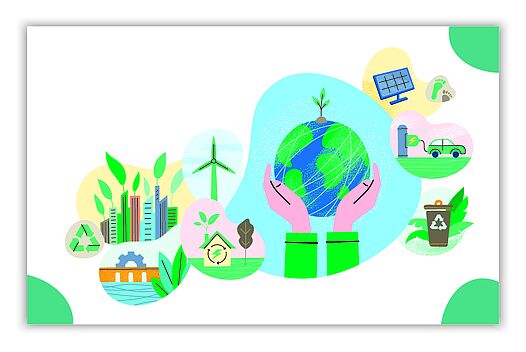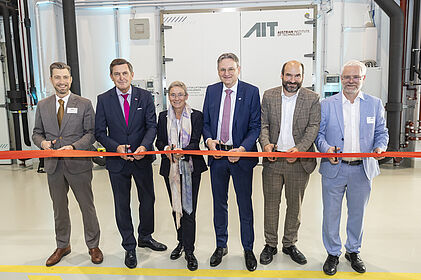A major conference organized by Viennese research institutions is looking for concrete and viable ways to make the economy and society more sustainable.
Originally, only foresters spoke of "sustainability": In 1713, Carl von Carlowitz, a Saxon chamberlain and mining councillor, recorded the idea in his work "Silvicultura oeconomica" that no more wood should be felled than can grow back. At that time, Carlowitz was faced with the problem that mining in the Ore Mountains required immense amounts of wood, but that it was becoming increasingly difficult to meet the demand for wood due to large-scale deforestation. Thus, he came to the conclusion that a planned, sustainable management of this resource was necessary. The natural scientist Alexander von Humboldt also knew how problematic human intervention in the environment can be. In 1844, he wrote the following remarkable sentence: "The climate of the continents [depends on the changes] which man [...] produces by the development of great masses of steam and gas at the centers of industry." Humboldt thus became another founding father of today's sustainability debate.
The word "sustainability" was introduced into common usage in 1987 by the Brundtland Report of the UN Commission on Environment and Development: With the basic idea of "meeting the needs of the present without compromising those of future generations," the modern concept of sustainable development was born, encompassing ecological, economic and social aspects.
Great goals of mankind
In 2015, the United Nations agreed on the 2030 Agenda, a global plan to promote sustainable peace and prosperity and protect our planet. The 17 "Sustainable Development Goals" it contains range from eradicating poverty and hunger to sustainable economic practices, protecting the environment and preserving biodiversity, and averting climate catastrophe.
These sustainability goals can probably be signed by anyone and everyone. And yet, in many areas, we're not really getting any closer to them, according to the annual progress reports published by the UN. "We are facing the greatest societal challenge, at least since the beginning of industrialization. Meeting it will not be possible without a comprehensive transformation of society and the economy," says Klaus Kubeczko, sustainability and innovation expert at the Center for Innovation Systems & Policy of the AIT Austrian Institute of Technology, describing the motivation for bringing a scientific conference on the topic to Vienna.
Systemic approach is necessary
One of the most important challenges, according to virtually all experts, is that it is not enough to find solutions to individual problems - because many areas are closely interrelated, and in some cases the goals contradict each other, at least superficially. Rather, a systemic approach is needed to enable change. "We see an urgent need to develop system innovations, finding solutions that can also resolve perceived contradictions between sustainability goals - for example, between economic development and reducing greenhouse gas emissions" says Kubeczko.
But how can such a change be understood and grasped at all, and how can we arrive at a positive picture of the future? In an era of change, how do society, business and politics manage to embark on and swiftly pursue a path to a future worth living? Such questions are at the heart of the 11th International Sustainability Transitions Conference (IST2020), which will take place from August 18-21, 2020. IST2020 is organized by AIT together with the Vienna University of Economics and Business (Research Institute for Urban Management and Governance) and the Sustainable Transitions Research Network (STRN).
This annual meeting, designed for the first time as an online conference to exchange previous experiences and the latest research results, will also highlight concrete, viable options for action in practice and facilitate a dialogue with practitioners. For this purpose, the conference is also financially supported by the City of Vienna, the Vienna Chamber of Labour and the Climate and Energy Fund.
From pilot projects to large-scale implementation
"There are many pilot projects that deliver very good solutions. But the question is: How do you make a successfully tested solution work elsewhere - and without a funding carrot?" sums up AIT researcher Gudrun Haindlmaier, who co-organized the conference. There are currently either no satisfactory answers to these questions, or they still challenge innovation ecosystems too much because of their complexity and resource intensity.
However, there are a number of initiatives that focus on large-scale disruption. These include, for example, the "European Green Deal," with which the EU wants to drive the transformation of the economy and society in the direction of greater sustainability and also sees this as a driver for jump-starting the economy. British researcher, activist and book author Ann Pettifor, who will give the opening keynote at the conference, has a lot to say about this. Pettifor was involved in the first "Green New Deal" initiative in the UK more than a decade ago, and she knows well the resistance to systemic change. Contributions dealing with systemic change from other angles will come from the other two keynote speakers: Koen Frenken (University of Utrecht) will talk about the role of platform economics and Karoline Rogge (University of Sussex and ISI Fraunhofer Institute) about the right policy mix to turn the energy sector around.
The program of the three-day conference is deliberately very broad. The range of topics includes energy transition, mobility transition, transition in the field of food and circular economy as well as governance processes in economy and state and the question of long-term change in society. The scientific contributions focus on the transition of energy systems and cities. On the latter topic, Vienna itself is a good example with its smart city projects as well as initial activities in the context of the Vienna International Building Exhibition 2022. The social dimension of sustainability will not be neglected either: there will be separate sessions on the topic of "just transition" and on the specific problems of the global south. In addition, there is a cooperation with the Vienna Children's University in the form of a workshop on the topic of "Sustainable City of the Future".

"We see an urgent need to develop system innovations, finding solutions that can also resolve perceived contradictions between sustainability goals - for example, between economic development and the reduction of greenhouse gas emissions" - Klaus Kubeczko, sustainability and innovation expert at the Center for Innovation Systems & Policy at the AIT Austrian Institute of Technology.
Cooperation of many partners
The participants at IST2020 are just as colorful as the program: Among the participants are researchers with more than 400 scientific contributions as well as policy makers and representatives of NGOs and grassroots movements who participate in the more than 40 dialog forums. This diversity is extremely important: Many building blocks for comprehensive -sustainable change have been developed in recent years, both in research and in implementation projects in practice. In the process, it often became apparent that psychological factors also play a role in determining the success or failure of the necessary cooperation between different actors and stakeholders, explains Haindlmaier, a transition researcher. "This has a lot to do with trust in other project partners and social groups." After all, "change always involves a great deal of uncertainty - and trust in collaboration helps to reduce the complexity of change processes. This applies from the smallest steps through collaborative research projects to international agreements."
The high need for collaboration also points to the central role of politics in shaping systemic change. "Government measures can provide impetus for system change in many ways, from subsidies to the definition of guiding principles and framework conditions to the targeted use of public investment," says Matthias Weber, head of the AIT Center for Innovation Systems & Policy. "The further we move towards system change, the more important the role of the state becomes in organizing coordinated action among the various actors and stakeholders in business and society who are helping to shape system change. And that means each and every one of us in our roles as citizens, decision-makers, managers and consumers."





